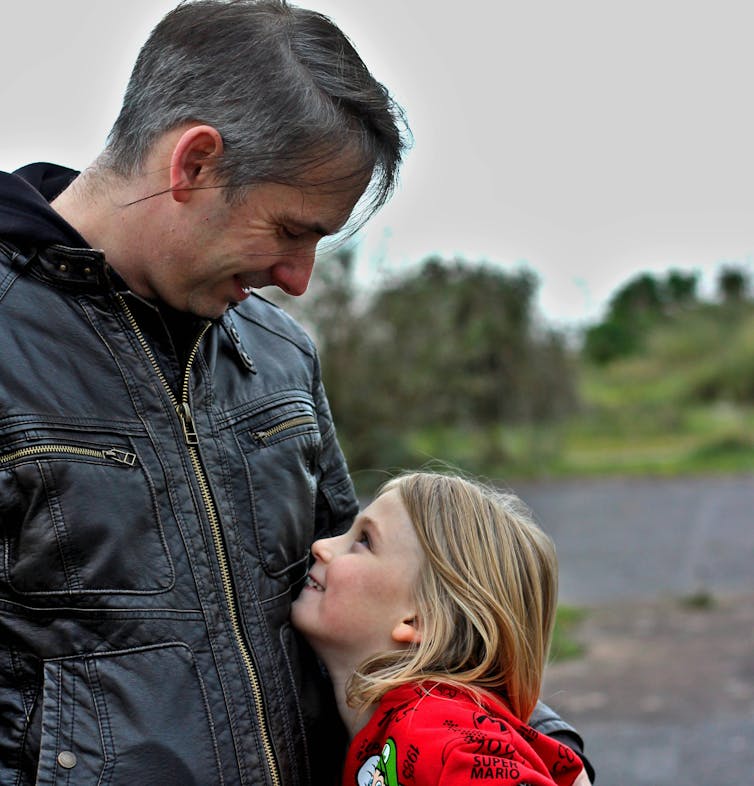With around one in 50 adults diagnosed with cancer each year, many people are faced with the difficult task of sharing the news of their diagnosis with their loved ones. Parents with cancer may be most worried about telling their children.
It’s best to give children factual and age-appropriate information, so children don’t create their own explanations or blame themselves. Over time, supportive family relationships and open communication help children adjust to their parent’s diagnosis and treatment.
It’s natural to feel you don’t have the skills or knowledge to talk with your children about cancer. But preparing for the conversation can improve your confidence.
Preparing for the conversation
Choose a suitable time and location in a place where your children feel comfortable. Turn off distractions such as screens and phones.
For teenagers, who can find face-to-face conversations confronting, think about talking while you are going for a walk.
Consider if you will tell all children at once or separately. Will you be the only adult present, or will having another adult close to your child be helpful? Another adult might give your children a person they can talk to later, especially to answer questions they might be worried about asking you.

Finally, plan what to do after the conversation, like doing an activity with them that they enjoy. Older children and teenagers might want some time alone to digest the news, but you can suggest things you know they like to do to relax.
Also consider what you might need to support yourself.
Preparing the words
Parents might be worried about the best words or language to use to make sure the explanations are at a level their child understands. Make a plan for what you will say and take notes to stay on track.
The toughest part is likely to be saying to your children that you have cancer. It can help to practise saying those words out aloud.
Ask family and friends for their feedback on what you want to say. Make use of guides by the Cancer Council, which provide age-appropriate wording for explaining medical terms like “cancer”, “chemotherapy” and “tumour”.
Having the conversation
Being open, honest and factual is important. Consider the balance between being too vague, and providing too much information. The amount and type of information you give will be based on their age and previous experiences with illness.
Remember, if things don’t go as planned, you can always try again later.
Start by telling your children the news in a few short sentences, describing what you know about the diagnosis in language suitable for their age. Generally, this information will include the name of the cancer, the area of the body affected and what will be involved in treatment.
Let them know what to expect in the coming weeks and months. Balance hope with reality. For example:
The doctors will do everything they can to help me get well. But, it is going to be a long road and the treatments will make me quite sick.
Check what your child knows about cancer. Young children may not know much about cancer, while primary school-aged children are starting to understand that it is a serious illness. Young children may worry about becoming unwell themselves, or other loved ones becoming sick.

Older children and teenagers may have experiences with cancer through other family members, friends at school or social media.
This process allows you to correct any misconceptions and provides opportunities for them to ask questions. Regardless of their level of knowledge, it is important to reassure them that the cancer is not their fault.
Ask them if there is anything they want to know or say. Talk to them about what will stay the same as well as what may change. For example:
You can still do gymnastics, but sometimes Kate’s mum will have to pick you up if I am having treatment.
If you can’t answer their questions, be OK with saying “I’m not sure”, or “I will try to find out”.
Finally, tell children you love them and offer them comfort.
How might they respond?
Be prepared for a range of different responses. Some might be distressed and cry, others might be angry, and some might not seem upset at all. This might be due to shock, or a sign they need time to process the news. It also might mean they are trying to be brave because they don’t want to upset you.
Children’s reactions will change over time as they come to terms with the news and process the information. They might seem like they are happy and coping well, then be teary and clingy, or angry and irritable.

Older children and teenagers may ask if they can tell their friends and family about what is happening. It may be useful to come together as a family to discuss how to inform friends and family.
What’s next?
Consider the conversation the first of many ongoing discussions. Let children know they can talk to you and ask questions.
Resources might also help; for example, The Cancer Council’s app for children and teenagers and Redkite’s library of free books for families affected by cancer.
If you or other adults involved in the children’s lives are concerned about how they are coping, speak to your GP or treating specialist about options for psychological support.

